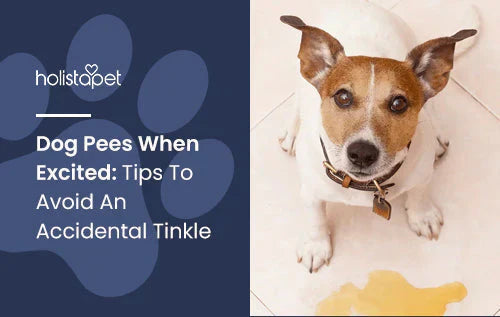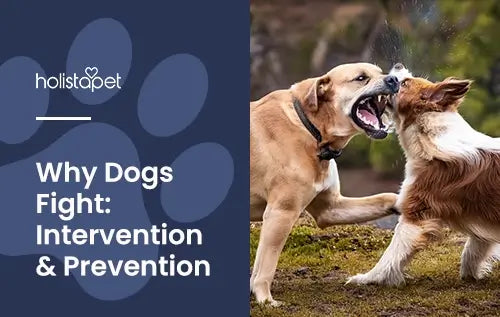You know your dog is excited when you see that wagging tail, those big eyes, and the ears raised and alert. Unfortunately, you might also see a little puddle. It's no good if your favorite pal pees when he's excited, so we've got some tips for curbing this behavior.
Why Do Dogs Pee When Excited?
Dogs are known for their enthusiastic greetings, but sometimes, that excitement comes with an unexpected accident. This behavior, known as excitement urination, is common in puppies and some adult dogs. Here are some key reasons if you're asking "why is my dog peeing so much:"
- Submissive Peeing: Submissive dogs pee to show any alphas in the area that they know their place and aren't a threat. When you adopt young dogs, you become the alpha in their life, which comes with the benefit of their loyalty but can also come with occasional puddles of pee. This is the most common reason why a puppy pees when excited.
- Health Issues: Sometimes, your dog's inappropriate pee when they're excited might have a medical cause. This is a fairly common issue for senior pets. If suddenly, your dog pees a lot when they're properly potty trained with no problems for years, it's probably a medical issue.
- High-sodium Diet: Inappropriate urination in dogs might occur if their diet has a lot of sodium. When your dog's level of sodium gets too high, they can suffer from an electrolyte imbalance called hypernatremia. It makes your dog extremely thirsty, leading them to drink more and subsequently pee more.
- Incontinence: Urinary incontinence is the medical term for involuntary peeing. There are several causes of incontinence, including infections, congenital defects, and nerve damage in the bladder or urinary tract.
- Urinary Tract Infection: A urinary tract infection (UTI) occurs when bacteria enter the bladder through the urethra. There are many causes of UTIs, but the most common are e. coli and streptococcus. Vets typically prescribe short-term antibiotics to treat UTIs, and they have a very high success rate.
Is Excitement Urination Common?
Submissive or excitement urination is a very common issue for puppies. Their animal instincts tell them you are an alpha figure, so they pee to show they know their place. It is not common for adult dogs. They should grow out of this behavior after the age of 12 weeks.

How To Stop Accidental Peeing in Dogs
There are a few things you can do during this time to help stop submissive urination and make sure they grow out of it by adulthood. Here are some keys to help you out:
- Don't Punish Them: Punishing submissive urination can make the problem even worse. Remember, your dog is probably peeing because they're nervous or afraid of something. Yelling at them when they pee will only reinforce their fears. Also, make sure to avoid direct eye contact since it has the same effect.
- Obedience Training: Obedience training teaches your puppy where to pee and where not to pee when excited, or calm. Most male dogs struggle with bladder control before the age of 12 weeks, so potty training will be very challenging for puppies under that age. Most trainers agree that the perfect time for potty lessons is between 12 and 16 weeks.
- Crate Training: Make sure you get a crate that is big enough for your dog to stand up, turn around, and lay down in. Place a dog bed and blankets in the crate to make it a comfortable place to sleep. Do not use crating as a form of punishment. The ideal crate is a safe space for nervous dogs to retreat and find safety in stressful situations.
- Consistency: Keep your dog's environment and routine as consistent as possible. Sudden changes like moving the furniture, changing their food, or having houseguests over can all increase your dog's distress and make excitement urination worse.

How To Calm An Excited Dog
The best way to stop accidental pee when excited is to get to the root of the problem. There are many ways to calm a nervous dog, and it never hurts to ask a vet for advice on the issue. To get you started, here are some time-honored tips for calming down your dog:
- Desensitization Training: Desensitization training helps your dog grow accustomed to scary situations. Instead of avoiding potential stressors, expose your dog to them in calm, controlled environments. For example, if your dog seems to fear other animals, try taking them to the dog park once or twice a week to meet other dogs.
- More Exercise: If your dog urinates when they're highly excitable, they might have a lot of pent-up energy. Try taking them on longer walks or increasing the number of walks they take each day. If your dog can release its energy in a productive setting, like exercising, they won't be so on-edge and excitable at home.
- Synthetic Pheromones: Pheromones are substances that animals excrete to mark their territory. These days, you can buy synthetic pheromones at most pet supply stores. The most popular type, DAP, replicates the natural pheromones that mother dogs release when they nurse. A DAP diffuser can help a dog feel safe and calm, reducing the risk of nervous peeing.
- CBD: Cannabidiol (CBD) is a natural compound present in hemp plants. It interacts with receptors in your dog's endocannabinoid system (ECS) to deliver numerous therapeutic effects. The ECS regulates vital functions like immune response, mood, memory, sleep, appetite, digestion, and more. By supporting this system, CBD can achieve great benefits.
Where To Purchase CBD Products
If you're looking for the best CBD for dogs, HolistaPet offers the highest-quality hemp products for pets (including cats and horses) based on the principles of natural, organic wellness. Check out our store page to find great deals on CBD oil, dog treats, shampoo, and more. For dogs with submissive urination issues, we highly recommend our Calming CBD Treats, which have the added benefit of L-theanine for maximum soothing effects.
Final Thoughts
Many dogs pee when they get excited. It's one of the most common problems for any pet owner, but that doesn't make it less annoying. The most important thing is to stay calm while you and your dog navigate this issue together. Panicking and punishing them will only make matters worse.
Stopping urination from over-excitement takes time. Be patient, especially with puppies, and give them lots of positive support when they pee outside. CBD treats make a great reward for good behavior in addition to supporting long-term wellness.
Next Read: How to Calm an Over Excited Dog Now Using These 7 Simple Techniques


 CBD Oil for Dogs - Fast Acting
CBD Oil for Dogs - Fast Acting
 Chicken Flavored CBD Oil For Dogs - Easy Dose
Chicken Flavored CBD Oil For Dogs - Easy Dose
 Salmon Flavored CBD Oil For Dogs - Highly Rated
Salmon Flavored CBD Oil For Dogs - Highly Rated
 CBG Oil for Dogs and Cats - Loved by Thousands
CBG Oil for Dogs and Cats - Loved by Thousands





Leave a comment
All comments are moderated before being published.
This site is protected by hCaptcha and the hCaptcha Privacy Policy and Terms of Service apply.